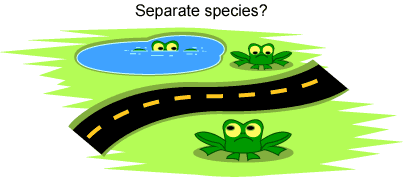
What is a species?
It is really laughable to see what different ideas are prominent in various naturalists' minds when they speak of species. It all comes, I believe, from trying to define the undefinable.
-Charles Darwin to J. D. Hooker, 1856
The species is the cornerstone of the binomial system of nomenclature—the basic unit of classification as well as a unit of biodiversity—yet agreement on what exactly constitutes a species is far from universal. If species were fixed and clearly distinct from each other (as Linneaus thought) there would not be an issue, but evolutionary processes cause species to change and to grade into one another.
Traditionally, species were defined by reference to a morphological type. The morphological species concept groups species based on structural similarities; in other words, they share more features with one another than they do with other organisms.
Probably the most useful approach is Ernst Mayr's biological species definition, "Species are groups of interbreeding organisms that are reproductively isolated from other such groups". Such a definition emphasizes the fact that species are dynamic entities that are continually changing in response to the evolutionary forces that shape them. It also points to the fact that species do exist in nature whether or not they have been described with a Latin binomial.
Of course, the biological species definition will not work for organisms that must reproduce asexually or are now extinct and found only in the fossil record. Thus, the evolutionary species concept proposed by George Gaylord Simpson may be the most useful from a taxonomic point of view. According to Simpson, "A species is a single lineage of ancestor-descendant populations which maintains its identity from other such lineages and that has its own evolutionary history.

Reference: http://bioweb.uwlax.edu/zoolab/index.htm